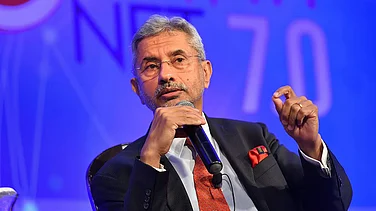The theme for World Mental Health Day 2022 is 'Make mental health and well-being for all a global priority'. While we are no longer riding on the Covid wave, the aftereffects of the two years of the pandemic, continue to play havoc on the physical and mental health of people from all age groups. Even children. Staying confined at home during the lockdowns or in quarantine if infected, witnessing loved ones passing away, being unable to meet and play with friends and attend school, seeing couple conflict, parents lose their job and become financially desperate or piled with more jobs in a way they disconnected despite working from home… these are few of the issues children have had to undergo.
Over and above, is the journey from adolescence to teenage, bodily changes, the realisation of likes and dislikes, peer pressure, competitiveness in school, mounting homework, etc. Not all children are able to articulate what they are undergoing.
As recorded in the Indian Journal of Psychiatry, School Mental Health Programme (SMHP) in India have been taking place over the past 40 years. However, these are mostly individual-specific or institution-specific endeavours, but no comprehensive nationwide programme. Plus, India is a geographically vast country with diverse socioeconomic conditions. Schools can differ in terms of resources, socioeconomic background of children, educational level of parents, and so on, and come under various central boards and state boards.
The need of the hour is:
• Establishing a steering body that can centrally regulate, coordinate (with various agencies and stakeholders), and monitor the implementation of a nationwide mental health programme
• Bringing all stakeholders (the school boards, school leaders, teachers, mental health professionals, parents and policymakers) on board for a nationwide mental health programme
• Large-scale sensitisation programmes for sensitising all the stakeholders
• A clearly defined system of implementation of school mental health programme
• Empirically tested and objectively defined content as well as clearly defined expected outcome of school mental health programme
• Training of the teachers
• Better utilisation of resources
Apart from the absence of nationwide mental health care for children, even the methods of therapy are mostly still limited to the detection and treatment of neurodevelopmental disorders Attention deficit hyperactivity disorder (ADHD), Autism spectrum disorder (ASD), Cerebral palsy, dyslexia and dyspraxia. But even children feel anxious. And anxiety can manifest in different forms for different children and it's best to stay vigilant about indicators that your child probably needs counselling.
Signs that your child is feeling anxious:
• They avoid situations or activities previously achievable (for example, refusing to partake in dance or sports activity they once enjoyed)
• There are changes in emotion regulation (for example, an increase in anger or irritability)
• Onset of regressions such as bed wetting, nail-biting, and/or clingy behaviour
• Experience physical symptoms such as headaches, tummy aches, and/or fatigue
• Rise of disruptions in daily rituals such as poor concentration, sleep, and/or appetite
Many children might just be coping with a sudden change that’s temporary. Like joining a new school or even a drastic change in weather, which should dissipate in two weeks. But to be sure, you can observe their behaviour:
• Check how often they exhibit any of the above-mentioned behaviour/s
• Check the severity (how disruptive or impactful it has been)
• Check the length of time you have noticed the symptoms
Before you approach a counsellor, try talking to your kid. Parents often find it difficult to talk about feelings and emotions with someone so young, afraid they might worsen the situation. Talking without judgment can work wonders and your child is grateful for your support and understanding. After having tried everything possible, at times, counselling seems to be the only solution.
Below are recommended ways to reach out for external help:
• Speak to your paediatrician to organise a referral for your child to see a private psychologist. Alternatively, your GP may write your child a health care plan to follow, to see if your child responds well to it, and whether they need the assistance of a counsellor.
• You can speak to your child’s early education or school teacher to access assessment and support.
The pandemic has placed a strain on health services, and there are often long wait lists to see psychologists and other specialists. While you are waiting, we recommend having a look at evidence-based online support and making sure the basics for symptom relief are in place.
Things you can try to help relieve your child’s anxiety
• Enough sleep and daily physical activity
Guidelines show children aged 5-17 years need between nine and 11 hours of sleep and at least an hour of exercise per day.
• Eating well
Research shows links between some foods and mental health, so make sure your child has a variety of fresh vegetables, fruit, legumes, and protein every day.
• Reconnect with friends
Social connections are important for healthy child development, improving well-being and decreasing symptoms of anxiety and depression. Supporting your child to remain connected and engaged with peers is critical.
• Gradual return to difficult situations
Lockdowns may have made it hard for some children to return to the bustling and potentially overwhelming environments such as school or stimulating extracurricular activity. If a child is struggling, it helps to plan for a gradual return at a slow, controlled rate.
Parents and carers are important people in kids’ lives, even when kids become teens. Being available to listen without judgement (and without trying to problem-solve) can help your child process their feelings, and build trust in their own ability to cope.






















